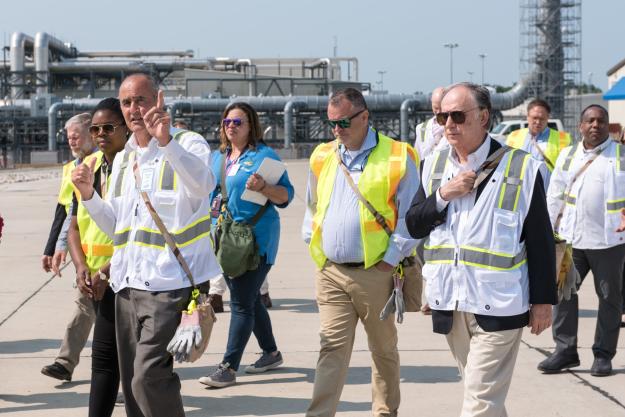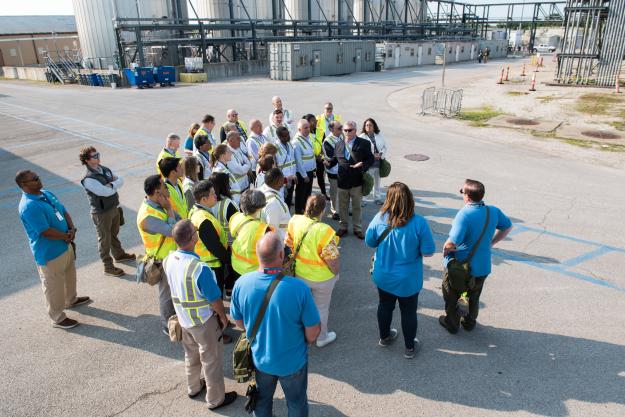At the invitation of the government of the United States (U.S.), a delegation from the Executive Council (EC) of the Organisation for the Prohibition of Chemical Weapons (OPCW) and the Director-General of the OPCW, Ambassador Fernando Arias, visited the Blue Grass Chemical Agent-Destruction Pilot Plant (BGCAPP) in Kentucky, U.S. from 12 to 14 June 2023. The delegation was led by the EC Chair, H.E. Mr Lucian Fătu, Permanent Representative of Romania to the OPCW, and consisted of representatives from each regional group.
After being received on 12 June by the Deputy Assistant Secretary of Defense for Threat Reduction and Arms Control at the U.S. Department of Defense, Mr Kingston Reif, OPCW delegates were briefed on the status of destruction activities at the Blue Grass facility. Briefings during the visit included: efforts undertaken by the U.S. to ensure that destruction activities are performed in a safe and environmentally compliant manner; an overview of the operations and progress made at the BGCAPP; and updates on the progress achieved at the U.S. second destruction facility in Colorado.
Ambassador Fătu remarked: "During the current volatile international arms control and security climate, the event that brings us together today provides much-needed evidence of the resilience of international norms against the use of chemical weapons."
The EC delegation and the Director-General participated in a tour of the BGCAPP facility on the morning of 13 June. Throughout the visit, U.S. officials and site employees demonstrated how the facility is being used to support the U.S. fulfilment of its obligations under the Chemical Weapons Convention for the elimination of its declared stockpile of chemical weapons.

Michael Abaie, Assembled Chemical Weapons Alternatives program executive officer, points to areas at the Static Detonation Chamber 2000 as members of the Organisation for the Prohibition of Chemical Weapons Executive Council tour the Blue Grass Chemical Agent-Destruction Pilot Plant June 13.
In his closing remarks following the facility visit, the OPCW Director-General underscored the significance of destruction efforts: "Soon, we will celebrate the completion of the destruction of all declared chemical weapons stockpiles. This will be a historic disarmament accomplishment and a success for multilateralism."
On 14 June, the EC visit concluded in Washington, D.C. with a roundtable discussion chaired by Under Secretary of State for Arms Control, Verification and Compliance, Ambassador Bonnie Jenkins and attended by U.S. Assistant Secretary for the Bureau of Arms Control, Verification, and Compliance (AVC) at the U.S. Department of State, Ms Mallory Stewart. Panelists included: Mr Pranay Vaddi, Special Assistant to the President and Senior Director for Arms Control and Non-proliferation at the U.S. National Security Council; Ms Kasia Mendelsohn, Principal Assistant Deputy Administrator, Department of Energy; Mr Matthew S. Borman, Deputy Assistant Secretary of Commerce for Export Administration at the U.S. Department of Commerce; Mr Kingston Reif, Deputy Assistant Secretary of Defense for Threat Reduction and Arms Control at the U.S. Department of Defense; and Ambassador Joseph Manso, Permanent Representative of the U.S. to the OPCW.
"The Chemical Weapons Convention remains deeply relevant to some of the most pressing global challenges of today. It was an honour to join U.S. interagency partners for a roundtable with OPCW Director-General and the Executive Council delegation. We are passionate in our determination to rid the world of chemical weapons and to ensure there is accountability for the proliferation, stockpiling, or use of chemical weapons by anyone, anywhere, and by any means," said Ms Stewart.

Mike Noyes (second from top left), Bechtel Parsons Blue Grass plant manager, provides an overview of the Blue Grass Chemical Agent-Destruction Pilot Plant during the Organisation for the Prohibition of Chemical Weapons Executive Council visit June 13.
Background
Based on decision C-16/DEC.11 of the Conference of the States Parties, all possessor States have to invite the Chairperson of the Executive Council, the Director-General and a delegation representing the Executive Council to undertake visits to obtain an overview of the destruction programmes being undertaken. These visits are to inter alia include visits to destruction facilities as well as meetings with parliamentarians, if possible, and government officials in capitals as a formal part of the visits. Invitations are to also be extended to observers to participate in the Executive Council delegation. The visits are to take place annually on the basis of biennial visits to the major possessor States concerned consecutively.
The United States, as the last chemical weapons possessor state, is close to completing the destruction of its remaining chemical weapons stockpiles in line with the Chemical Weapons Convention obligations. Inspectors from the OPCW Technical Secretariat monitor and verify destruction progress on site 24/7.
There are two remaining declared chemical weapons stockpiles in the world, both in the United States. As of 31 May 2023, the United States has completed the destruction of 99.8% of its declared Category 1 chemical weapons. All Category 2 and 3 chemical weapons declared by the United States have already been destroyed.
The Blue Grass Chemical Agent-Destruction Pilot Plant is designated to destroy all nerve agent-filled munitions stored at the Blue Grass Chemical Activity Chemical Weapons Storage Facility.
As the implementing body for the Chemical Weapons Convention, the OPCW, with its 193 Member States, oversees the global endeavour to permanently eliminate chemical weapons. Since the Convention's entry into force in 1997, it is the most successful disarmament treaty eliminating an entire class of weapons of mass destruction.
Over 99% of all declared chemical weapon stockpiles have been destroyed under OPCW verification. For its extensive efforts in eliminating chemical weapons, the OPCW received the 2013 Nobel Peace Prize.






